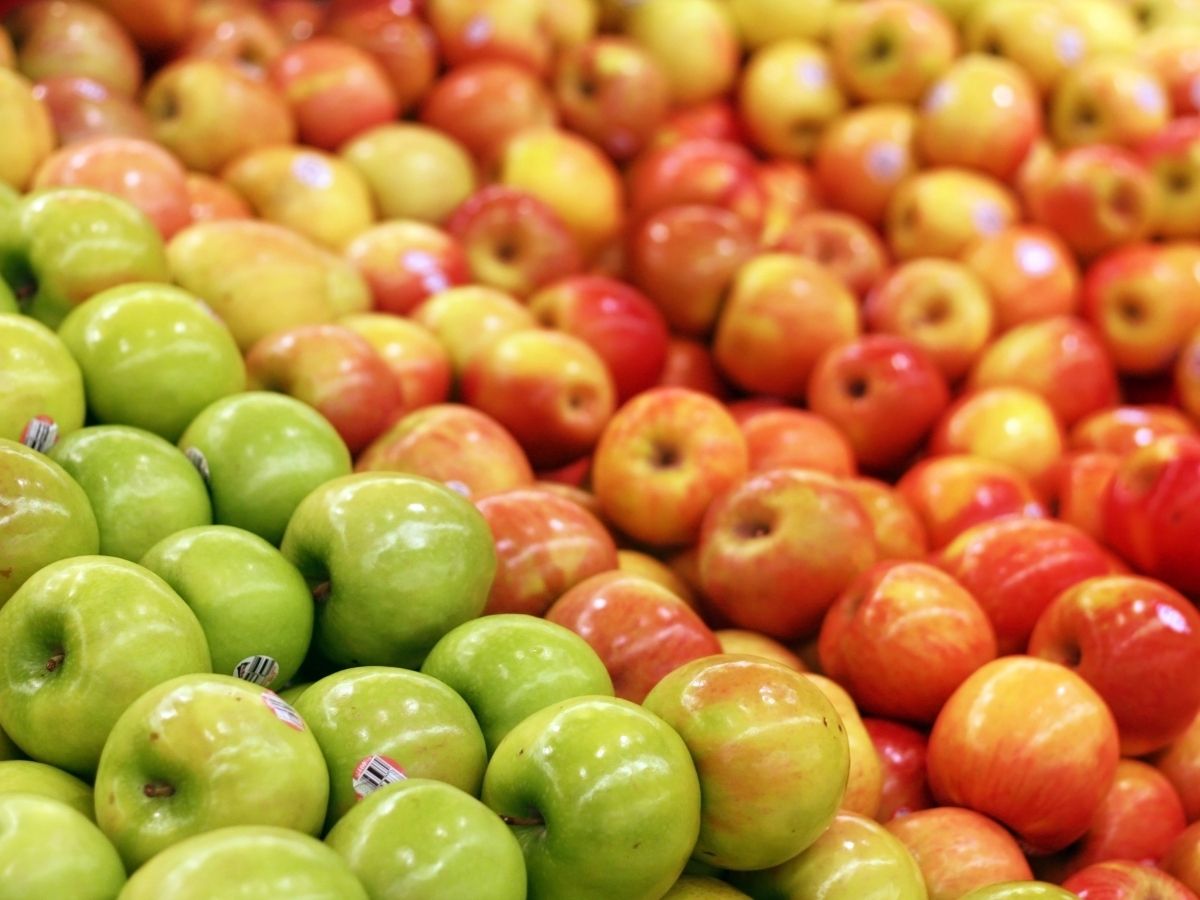At Natural Health, many people ask, “Is apple good for diabetes?” Apples are widely recognized not only for their delicious taste but also for their rich nutritional profile, making them an excellent fruit choice. Thanks to their fiber, antioxidants, and beneficial plant compounds, apple is good for diabetes by helping support stable blood sugar levels and overall health. In this article, discover why apples stand out as a smart fruit choice for diabetes and how to enjoy them without compromising your health.
The nutritional value of apples
Apples offer a wide range of health benefits, thanks to plant-based compounds called flavonoids and a special type of fiber known as pectin, which breaks down in your gut to support digestion, making apple good for diabetes when enjoyed in moderation.
Phytochemicals
Most of the beneficial compounds in apples, especially the phytochemicals are found in the skin. These natural plant substances may support overall health and help protect the body from various diseases. So, if you peel your apple, you’re missing out on much of its fiber and flavonoid content.
Fiber That Works for You
Apples are a great source of fiber, which helps slow down digestion and keeps you feeling full longer—an effective way to curb overeating. Fiber also supports digestive health, easing both diarrhea and constipation. For those dealing with acid reflux, fiber-rich foods like apples can help reduce symptoms and discomfort.
Heart and Blood Vessel Protection
Research suggests that the fiber and plant compounds in apple peels may protect your blood vessels and heart from damage. These components can help lower cholesterol levels and may also defend your cells’ DNA against oxidative damage—a process linked to aging and cancer development.
Antioxidants That Defend Your Body
Apples are rich in antioxidants that help slow the growth of cancer cells. These powerful compounds may also protect the pancreas and help lower the risk of developing type 2 diabetes.
The table below shows the nutrient content of a medium apple. It also shows how much an adult needs for each nutrient, according to the 2020–2025 Dietary Guidelines for Americans. And a person’s nutritional needs can vary depending on their age and sex:
| Nutrient | Amount | Daily adult requirement (ages 19-30) |
| Energy (calories) | 104 | males: 2.400
females: 2.000 |
| Protein (g) | 0.52 | 10–35 |
| Total dietary fiber (g) | 4.8 | males: 34
females: 28 |
| Calcium (mg) | 12 | 1.000 |
| Iron (mg) | 0.24 | males: 8
females: 18 |
| Magnesium (mg) | 10 | males: 400
females: 310 |
| Potassium (mg) | 214 | males: 3.400
females: 2.600 |
| Vitamin C (mg) | 9.2 | males: 90
females: 75 |
| Folate (mcg) | 6 | 400 |
With all these impressive health benefits, you might be wondering whether apples are good for diabetes. Let’s dive into how apples affect blood sugar levels and why they can be a smart fruit choice for people managing diabetes.
Is apple good for diabetes? How Do Apples Affect Blood Sugar Levels?
Absolutely, apples are good for diabetes. Apples can be a healthy and satisfying choice for people managing diabetes. They’re rich in fiber, which helps slow sugar absorption and may prevent blood sugar spikes. Most of the sugar in apples is fructose, which may have a gentler effect on insulin levels compared to glucose. Still, it’s important for people with diabetes to consider how apples fit into their overall diet. At Natural Health, we explore how consuming apples and other fruits might impact people with diabetes.

Apples Only Cause a Mild Blood Sugar Rise
Apples only moderately affect blood sugar levels, making them a great fruit choice for people managing diabetes. Their high fiber and natural fructose content help slow the rise in blood glucose. However, as with all carbohydrate-rich foods, it’s important to enjoy apples in controlled portions.
Apples may reduce insulin resistance
Regularly eating apples may help reduce insulin resistance, a condition common in people with type 2 diabetes where the body struggles to produce enough insulin or use it effectively. This benefit largely comes from the polyphenols found mainly in the apple’s skin. These powerful compounds may enhance insulin sensitivity, allowing the body to use insulin more efficiently and better regulate blood sugar levels.
The antioxidants in apples could help reduce your risk of diabetes.
The antioxidants in apples may help lower the risk of developing diabetes. A 2019 review of multiple studies found that regularly eating apples and pears was associated with a reduced risk of cardiovascular disease and type 2 diabetes[1]. Antioxidants are natural compounds that protect your body by neutralizing harmful chemical reactions. Their potent benefits promote overall health and provide protection against chronic diseases, which is why the antioxidants in apples are believed to play a crucial role.
To better understand how to enjoy apples as part of a diabetes friendly diet, here’s a helpful guide to eating apples for diabetes.
Guide to eating apple good for diabetes
Adding apples to a balanced diet is both easy and versatile, particularly for those managing type 2 diabetes. According to the American Diabetes Association, you can enjoy the benefits of apples without worrying about blood sugar spikes by pairing them with protein, opting for whole apples rather than juice, and distributing your apple intake evenly throughout the day[2]. Here are some practical tips to help you include apples in your meals:
- Enjoy apples with a bit of protein, like cheese or nuts, to reduce their impact on blood sugar.
- Choose whole apples over apple juice to get more fiber and prevent rapid blood sugar spikes.
- Likewise, opting for fresh fruit instead of dried helps avoid excess sugar concentration.
- Add sliced apples to salads, oatmeal, or cottage cheese for extra flavor and nutrition.
- While canned fruit can be a healthy option, it’s best to select varieties packed in natural juice instead of sugary syrup.
People with diabetes are advised to eat no more than 1 to 2 apples daily. If eating two, it’s best to space them out over several hours to help maintain stable blood sugar levels. Apples are packed with essential nutrients such as vitamin C, fiber, and powerful antioxidants. In fact, a large portion of these nutrients is found in the skin. That’s why, for maximum nutritional benefit, it’s recommended to wash apples thoroughly and enjoy them with the skin on. With their impressive nutritional profile and blood sugar–friendly fiber content, it’s clear that apple is good for diabetes when consumed mindfully. Now, let’s explore why apples are a smarter and healthier fruit choice for those managing diabetes.
Why Apples Are a Smarter Fruit Choice for Diabetes

To better understand why apples are often recommended for people with diabetes, let’s take a closer look at how they compare to other popular fruits.
| Criteria | Apple | Grapes |
| Glycemic Index (GI) | Low to medium (36–40) | Medium to high (50–59) |
| Natural Sugar (per 100g) | About 10g | About 16–18g |
| Fiber Content | 2–4g (mainly in the skin) | 0.9g |
| Antioxidants | Rich in flavonoids and polyphenols, especially in the peel | Contains resveratrol, but in lower and less consistent amounts |
| Impact on Blood Sugar | Moderate impact; helps stabilize when paired with protein or healthy fats | Causes quicker spikes due to high sugar and low fiber content |
While grapes are rich in antioxidants, apples are generally the safer and more diabetes-friendly choice due to their lower glycemic index, higher fiber content, and more stable impact on blood sugar, reinforcing the idea that apple is good for diabetes when eaten in moderation.
Frequently asked questions
Do apples raise your blood sugar level?
Yes, apples can raise blood sugar because they contain carbohydrates. However, their low glycemic index (GI) means they cause a slower, more controlled rise in blood glucose compared to high-GI foods. [3]
How many apples can a diabetic eat per day?
A person with diabetes can generally include 1 to 2 servings of apples each day, as long as it fits within their carbohydrate goals and overall meal plan.
Can diabetics eat apples at night?
Absolutely! People with diabetes can still eat apples at night. However, being mindful of portion size and timing is key to maintaining stable blood sugar levels.
Are apples better than bananas for people with diabetes?
Yes, in general, apples are a better choice than overripe bananas for people with diabetes due to their lower glycemic index (GI). This means apples cause a slower and more moderate rise in blood sugar levels—making apple good for diabetes when included as part of a balanced diet.
Read more: Is banana good for diabetes? Expert Insights 2025
What is the best fruit for a person with diabetes?
Including a variety of fresh, frozen, and canned fruits without added sugar is suitable for people with diabetes. In particular, berries like strawberries and raspberries stand out for their lower glycemic index (GI) and higher fiber content compared to many other fruits. [4]
Natural Health emphasizes that apple is good for diabetes due to its unique combination of fiber, polyphenols, and antioxidants, which work together to moderate blood sugar levels and reduce insulin resistance. By following these simple strategies, people with diabetes can enjoy the nutritional benefits of apples without risking blood sugar spikes. Ultimately, apples are a smart, tasty, and versatile fruit that supports both diabetes management and long-term wellness.


Last medically reviewed on
How we reviewed this article:
[1] Effects of Intake of Apples, Pears, or Their Products on Cardiometabolic Risk Factors and Clinical Outcomes: A Systematic Review and Meta-Analysis; Bridget A Gayer, Esther E Avendano, Emily Edelson, Nanguneri Nirmala, Elizabeth J Johnson, Gowri Raman; 2019
[2] American Diabetes Association; 2024
[3] Glycemic Index and Glycemic Load; Barbara Delage, Ph.D.; 2016
[4] Dietary berries, insulin resistance and type 2 diabetes: an overview of human feeding trials; Aaron Calvano, Kenneth Izuora, Edwin C Oh, Jeffrey L Ebersole, Timothy J Lyons, Arpita Basu; 2019
Share this article
Read this next
Is water lemon good for diabetes? What should you know
Lemon water is good for diabetes, not just because it’s refreshing, but because it offers real support for blood sugar control. With zero added sugar, rich in vitamin C and antioxidants, it may help improve hydration, aid digestion, and reduce post-meal blood sugar spikes. At Natural Health, we break down how to make lemon water…
Apple cider vinegar for diabetes: The research says and tips to use
At Natural Health, we explore the growing interest in apple cider vinegar for diabetes. Studies suggest it may help improve insulin sensitivity and lower blood sugar levels after meals. This article explains how apple cider vinegar works, how to use it safely, and what people with diabetes need to know before adding it to their…
Is sweet corn good for diabetes? Dietitians explain
At Natural Health, we know many people managing blood sugar often ask, is sweet corn good for diabetes? The short answer: YES, with the right portion. Corn contains fiber, vitamins, and antioxidants that support overall health. In this guide, we break down how corn fits into a diabetes-friendly diet and how to enjoy it without…